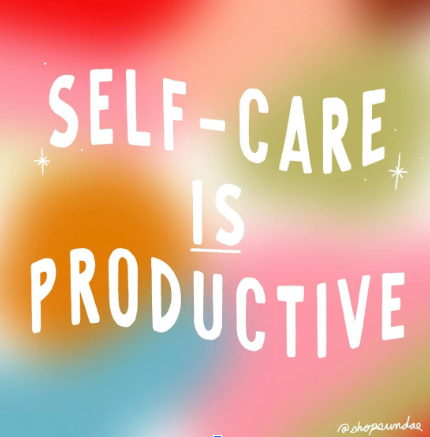The Basics
“You’re not alone,” a phrase so simple yet it’s the hardest to grasp when struggling with mental health. It’s what I like to call, “the golden rule” of mental health. Whether it’s you who’s battling a mental health disorder or someone you know, it’s still a journey. What matters most is that you never lose touch with the fact that you make an impact, and a difference– a true difference.
Prioritize self-care!
Some things you may not think twice about actually make a huge difference when it comes to your mental health. Though these things may just seem like everyday occurrences or like they won’t impact you greatly, they are all strategies that can be used and can help you, which is the goal!
Simple…but Effective Methods to Try:
Sleep!
Your sleep schedule is actually really important. We can even take this back to the most knowledgeable source: science! Studies have shown that chronic sleep problems affect 50% to 80% of patients struggling with mental health and that most of these cases started in the patient’s childhood and grew with them. My advice is to start now! That doesn’t necessarily mean that every day has to be strictly ordered with when to go to bed and before-bed routines, but it means that sleep is important and should be a top priority. It affects your body which affects your mind and emotional state.
Take time for your hobbies.
Something that you do every single day or a few times a week can be a crucial factor in taking care of your mental health! A hobby you have or something that you’re good at and like to do makes a huge difference. Having something to take your mind off of what has been stressing you out is HUGE. Distracting yourself from negative thoughts and reminding yourself that you are good at this, even if it’s one thing, can impact the way you look at the situation you’re currently in.
Journaling.
Journaling is one of the most proven effective strategies when it comes to improving your mental health yet there are so many stereotypes that surround it. A common misconception is that journaling has to have a strict purpose or schedule that goes along with it. That’s false! The whole point of journaling is to reflect and understand yourself and your emotions better. Therefore, you should choose a method that makes you happy. Whether that’s writing down the highlights of your day or if it’s bullet journaling with intricate details and ideas. All options have one common goal; to help improve your mental health. Journaling is not for everyone but it is certainly worth a try.
Meditation.
Meditating is also often dramatized. Meditation does not always have to look like sitting in silence with your eyes closed, it can look like an array of things that are all equally as helpful! Mantra meditation includes using words and phrases to help you develop a common goal and that can drastically help with goal-setting which goes hand-in-hand with mental health! Meditation is all about adapting to the type of person who is participating in it. Some kinds of meditation are compatible with religion and others will focus on the environment around you, which will vary depending on the person. Focus meditation is a common one, where you use your 5 senses to detect things and stabilize and focus your attention on things around you. It works as a distraction method from mental health disorders that can be controlling the better half of your mind. Like any other coping strategy, it’s always worth a try! Who knows?! It could be the difference between a good day and an awful day!
Talking.
Talking to others, whether it’s a friend, a professional, or a trusted adult is a key way to get things off your chest which can help to release stress which is a driving factor in mental health. It takes a lot of courage to recognize in yourself that you need help or that you need to talk to someone about your mental health and your personal struggles. It’s not an easy task and it’s not always something that will feel like it’s benefiting you immediately when you start. But in the end, just letting go of the “secret” or releasing what keeps you from enjoying things you like is a huge part of improving your mental health. Everyone, no matter if they have a mental health disorder or not, needs to have a talk sometimes. Even if you’re not ready to talk, sometimes listening to a friend can help too. Whether you or a friend are doing the talking, you’re both showing courage and reminding each other that you are not alone.
Take a Break…..Really!
Lastly, take a break. This is one of the MOST crucial things that you can do for yourself. The effect that taking a day off can have is crazy! Just an hour to yourself, just a few minutes to stop and take a moment to clear your mind. If work or school or whatever is causing you more stress than usual OR you feel like you could benefit from a day off, you deserve it. Recently, schools and some places of work have allowed their employees to take a day off, calling it a “mental health day.” Though this is amazing and a huge step in the right direction, we need to stop stigmatizing mental health and the fact that it is okay to take time for yourself. I, someone that has struggled with the idea of taking a day off, am here to tell you that it is okay. Take a day, and do it without stressing about what you’re taking a break from. It can work wonders.
Do What Works for You
So many things make small differences, which in the long run are equal to big differences. Taking the time to try different things to figure out what works best for you is something that isn’t discussed often. What works for someone else may not work for you and that is okay! Just like everything else in the world, it will take time to find what helps you the most.
If you’re reading this and you feel alone, like no one understands, Erika’s Lighthouse is here to tell you that it will and it can get better. All of the things mentioned in this blog and much more can help you with your mental health journey. It is up to you to take that step and make it happen. It is possible; you have the strength to do it. Be kind, to yourself, and to others because you don’t know who might be struggling. And remember: You are not alone.








Absolutely amazing words and reminders for our teens. Mental health needs to be the top priority always.
It NEEDS to be prioritized in our school systems. Clear and well balanced mental health that is given proper priority can only help to strengthen all of the other things that are made to take precedence in our brains (school, tests, friends and relationships, etc.).
Take care of mental health and the rest will see positive results as well.
Excellent article with doable solutions.
I absolutely LOVE that these words are being written by a teen. We need mental health to become a PRIORITY always! Find a person that you trust. Talk and keep talking. My door is always open.
Love, love, love the guidance and suggestions Evangeline shares. So wise and caring. I hope we each add one idea to our routines for self care and share with others.